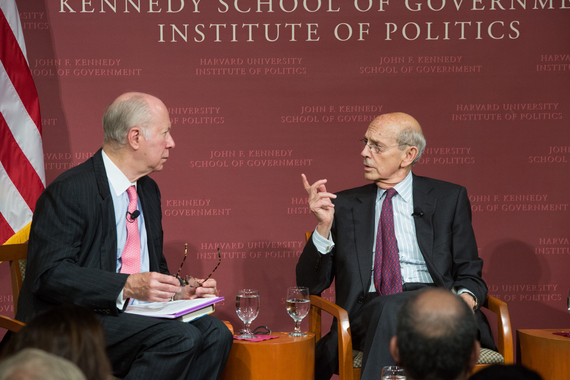
By Dahlia Huh, Harvard Class of 2019

Supreme Court Justice Stephen Breyer with moderator David Gergen at the John F. Kennedy Jr. Forum on November 6, 2015.
Politics is polarizing. Liberals versus conservatives, millennials versus traditionalists, idealists versus pragmatists - politics creates disagreements and often divisions between Americans. We have now come to expect the head-to-head clashes between politicians with opposing views and have seen how the law can be ever so contentious. At first appearance, the Supreme Court may seem to fall in line with this rule with its frequent nail-biting cases, (exhibit A, the Obergefell v. Hodges 5-4 decision earlier this year). But according to United States Supreme Court Justice Stephen Breyer, the opposite holds true.
Breyer was nominated to the Court in 1994 by President Bill Clinton, and has generally been associated with the more liberal side of the Court. Throughout his years serving, the Justice finds it "strange that people feel that political disagreement is cause for personal disagreement." Instead of polarizing people, the law is in fact, a uniting tool. Uniting thousands of opinionated parties through a written compromise, the law is a settlement that maximizes utility and produces the most good for society as a whole. "People resolve their differences under law," and it is a phenomenon Breyer witnesses "every working day."
But what if you are the one deciding the law? The nine Justices have their work cut out for them, after all, "the freedom of speech, 1st amendment, liberty - I mean, those words don't explain themselves," remarks Breyer at the John F. Kennedy Jr. Forum on November 6, 2015. Knowing that the interpretation of the Constitution, the backbone of American democracy, lies in the hands of nine, granted brilliant, individuals goes to show the level of trust that citizens place in the judicial system. The interpretation of the 228-year-old Constitution, however, is apparently less daunting than the task might seem. Breyer notes that "the circumstances change, but the values don't", and therefore having a solid sense of identity and a strong set of values is the key to deciding the eighty monumental cases the Court votes on each year. In a way, this lesser commitment to political party affiliation, which is typically intensified in our elected officials, is the reason why Americans trust just nine judges to make some of the impactful decisions in our day to day lives.
Breyer touched on the topic of the death penalty, pirates, and even compared the appointment process to the Court to a recipe of chicken cacciatore. A man of humor, seriousness, and a dedicated sense of purpose to the law, Justice Breyer is truly an incredible public servant. Politics may be polarizing, may be unifying, but at the end of the day, trust in our Justices will lead us to justice.
